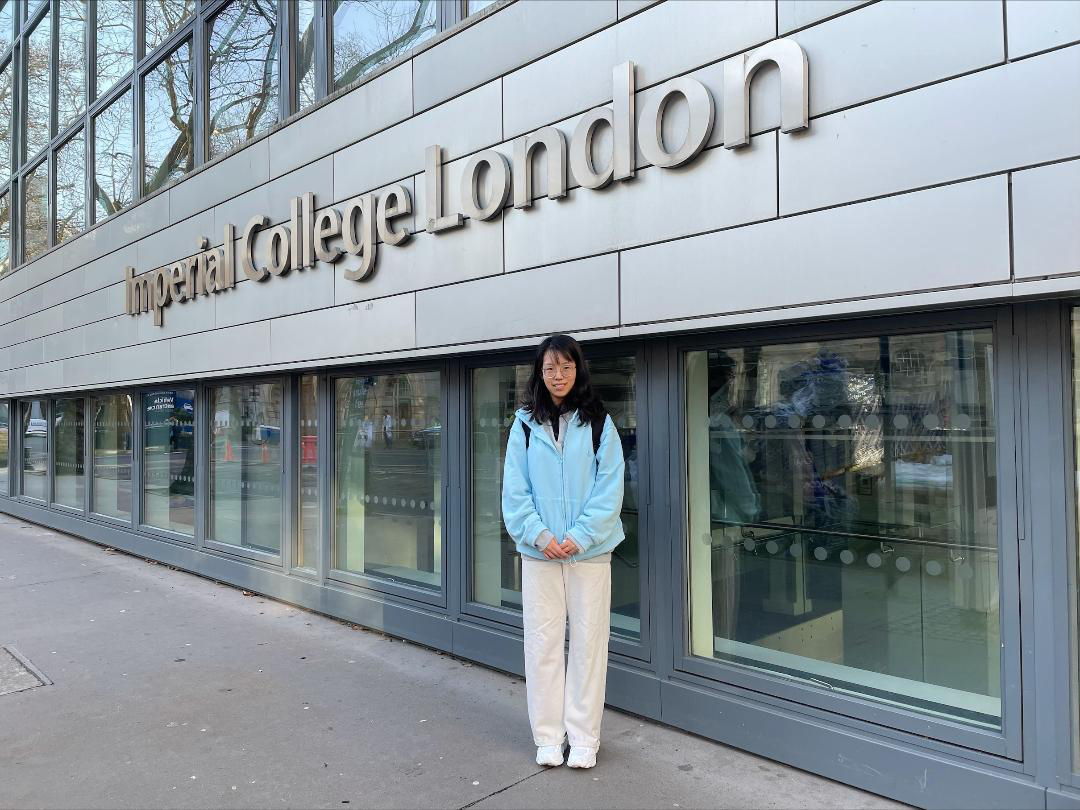- Research
- Science
- Jon Mark Beilue
- Featured
Jon Mark Beilue: From China to London by way of WT
Yidi Hou takes what she learned in Canyon to prestigious Imperial graduate school
The pursuit of an education has taken Yidi Hou to places and cultures that five years ago she could have not imagined. In 2017, she completed her high school education – or fundamental education – in Tai’an, a city of 5.6 million in the Western Shangdong province of China.
Today, she’s pursuing a master’s degree in the environmental sciences field at Imperial College in London – more than 5,000 miles west of where Hou called home. But before that, and certainly connecting the two cities, was a swing 6,650 miles to the east and four productive years spent at West Texas A&M University.
Tai’an was not nor will it ever be on WT president Dr. Walter Wendler’s goodwill tour of high schools. But for one fulfilled student from half a world away, WT had what she was looking for and her four years were worth the investment.
“WT was truly amazing and unforgettable for me,” said Hou from London. “I am sure it will impact me forever.”
Hou has always been concerned about environmental issues since she was a child. Knowing she would be an international student in the United States in the field of environmental sciences, Hou researched American universities and was attracted by WT’s educational offerings, teaching method and study environment.
She also would meet a kindred spirit in Dr. Naruki Hiranuma, associate professor of environmental science. He forged a similar path, coming to WT from Japan, earning a degree before eventually obtaining his Ph.D. in atmospheric science at Texas A&M University. He returned to teach at WT in 2016, one year before Hou arrived.
“When I came to WT 16 years ago, I was pulled aside by an Amarillo airport security guard who asked me how it was going,” said Hiranuma. “I said, ‘no,’ because the only words I knew were ‘yes, ‘no,’ and ‘I love you.’
“Yidi is on a similar trajectory so I’ve had some connections and at times sympathies for her. She has gained experience not only in the sciences, but about life in West Texas.”
That Hou was one of the 12 percent accepted into Imperial College’s selective graduate program fairly speaks to not only her, but also WT. She arrived in Canyon in 2017 having taken a standard class in English in Tai’an, which was required, but it was not really spoken.
“At first English was very difficult to conquer,” she said.
Hou did enroll in an English as a second language course before entering WT in 2017 and continued to work on her English while on campus. In addition to greatly improving conversational English, Hou honed her skills in academic writing and presentation skills.
“The greatest thing about WT is it gives students unlimited support,” she said.
Hou listed professors that took an extra interest in her and her studies, beginning with Hiranuma, her adviser. Knowing some of the difficulty in acclimating to a different culture, Hiranuma invited Hou to family dinners, and then hired her as a research assistant.
“That allowed me to get incredibly close to research and piqued my research interest,” Hou said. “Dr. Hiranuma always clarified and discussed my questions as well as providing necessary research help. Professors get to know each student and provide us feedback while answering our questions. When professors are willing to help that leads to effective learning.”
The WT Writing Center helped unlock more communication barriers and several international scholarships helped ease financial costs. Campus organizations helped her adjust socially.
“As an environmental science student who was also an international student, I had to learn how to contribute and communicate effectively in a group project,” she said, “as well as improve my report-writing skills. I had what I needed to bridge the cultural divide and alleviate my communication anxiety.”
Hou’s language skills improved enough to lead two online presentations at international environmental conferences. Those were part of an overall study on the environment and cattle feedlots, which reflects WT 125: From the Panhandle to the World , WT’s long-range plan.
She was co-author of the peer-reviewed publication “Laboratory and Field Studies of Ice-Nucleating Particles from Open Lot Livestock Facilities in Texas,” and led a study titled “Characterization of Physiochemical Properties of Feedlot Dust Ice Crystal Residuals.” In addition, she contributed to three other conference presentations.
“She is one of the best undergraduate students I’ve mentored in the last five years,” Hiranuma said. “She’s a very calm quiet student. She’s more like a thinker who goes out there and looks at all the evidence carefully rather than just immediately speak up.
“Her critical thinking skills are very good, and that’s important to have as a scientist rather than just being aggressive. She has all the elements to be a good scientist in the future.”
Hou wants to eventually earn a doctorate and continue research. That’s not possible without graduate school. Hou graduated from WT in May with a GPA of 3.69. She applied to 12 graduate schools, including Imperial College.

Photo: West Texas A&M University graduate Yidi Hou now attends Imperial College in London./p>
Imperial was the twinkling star at the top of the tree. In the latest QS World University rankings, Imperial pulled ahead of Oxford into a tie with Cambridge as second among Great Britain universities. Imperial specializes in science, technology, engineering and medicine.
Imperial turns down nearly 90 percent of worldwide graduate school applicants. Hou’s research and published work was key in her acceptance. And when she was notified as such last summer?
“I was shocked,” she said. “I just felt like it can’t be true.”
Hou began classes in London in October and will graduate in September. In addition to a master of science degree, she is focusing on Centre of Environmental Policy that emphasizes soil, water and air pollution.
“The classes at IC are intense,” Hou said, “and it’s hard to stay up because the professors go through the knowledge quickly. But WT gave me the fundamental knowledge and developed good study habits, so it’s not that difficult to catch up.”
Hou using WT as a springboard is a pat on the back to the university and its new mission.
“Having a student like Yidi go to a prestigious graduate school, especially outside the United States, that is good for our environmental science program and for WT,” Hiranuma said. “Dr. Wendler has really sold the concept of WT 125: From the Panhandle to the World , and what Yidi has done has demonstrated that – from China to WT to the UK. She is a great representation of what WT 125 is trying to do.”
Do you know of a student, faculty member, project, an alumnus or any other story idea for “WT: The Heart and Soul of the Texas Panhandle?” If so, email Jon Mark Beilue at jbeilue@wtamu.edu .

